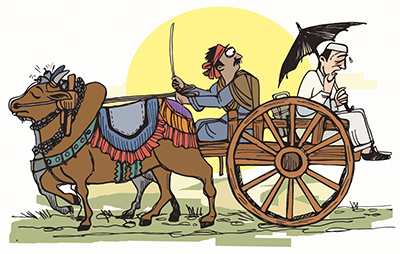In his service - I
Berjis Desai
While the hours for India’s Independence were being counted, a handsome 42-year-old mobed with a glowing red complexion was summoned to perform a navjote in a village called Mangrol in Surat district. Priesthood had run in his family for generations and none knew any other trade or calling. Originally from Mandvi, another town near Surat, the mobed had migrated to Navsari and worked as a full-time priest in the fire temple. He had six children from a wife well versed as a gorani (a priest’s trained wife).
The mobed took a local train to Kim railway station, some 24 kms from Surat, to travel further to his hometown of Mandvi where he had an early dinner with his paternal cousin who arranged for a bullock cart to ferry the mobed to Mangrol.
Early morning, he sat in the bullock cart which had no cover and prayed to pass the time. The May heat was at its peak, as the cart owner took a short cut through a forest. The mobed enjoyed the packed lunch of thick bajra rotis and an onion-coriander omelet made out of duck eggs. This made him extremely thirsty, and he realized to his horror that he had forgotten to carry the brass vessel containing well water. With every passing moment, the mobed’s discomfiture multiplied. His parched throat and dry lips desperately craved water. The young bullock cart owner, realizing his passenger’s acute dehydration, tied the bullock to a tree and ran into the forest to fetch water. A nearby river bed was dry and arid. No village or well was in sight. After nearly three hours, he returned to the cart to find the mobed in a semi-comatose condition, trying to recite some prayer with his pupils dilated and an ugly noise emanating from his throat. The cart owner ran in a different direction where he at last found a hamlet of Adivasis whose inhabitants gave him water. He drank some himself and ran with a clay pot on his head to the cart, only to find that the mobed had breathed his last. His body was brought to Mandvi in the same bullock cart.

Illustration by Farzana Cooper
Some 22 years earlier, when the mobed was a lad of 20, his father, on an assignment to extend wedding invitations to residents of villages near Navsari on a bullock cart, had succumbed to dehydration in eerily identical circumstances.
The Mumbai Samachar of June 16, 1947 carried this story in gory detail, cautioning its readers not to forget to carry water while travelling in the hinterland.
The mobed’s eldest son, already an ordained priest from the Dadar Athornan Madressa, joined as a boiwala in the Rustom Framna Agiary in the Dadar Parsi Colony. Tall and sturdy, he had inherited the ruddy complexion of his late father. They called him "Kabuli” (Afghan looking) and he served the holy fire for nearly two decades, with exemplary piety and dedication. Supporting his widowed mother and many siblings, he remained a bachelor to ensure that his four sisters, educated free of cost at the Avabai Petit School at Bandra, were married into good homes. Finally, at 36, he decided he would start a family of his own and got engaged to a priest’s daughter.
One Sunday night, after he had performed the boi and struck the bells with vigor to mark the commencement of the Ushahen gah, he retired to his quarters to rest and passed away peacefully in his sleep, without any cause or ailment.
His mother just smiled and said: "He had given, and He has taken.” His younger brother, a practising mobed in Navsari, and his young bride were, however, disconsolate.
They decided to perform the navjote of their eldest daughter on the first death anniversary of the Kabuli. It was 1968. Weeks before the navjote, the river Tapi overflowed its banks and floods ravaged Gujarat. Wading through knee deep water, they managed somehow to reach the venue and perform the navjote. Exactly a week later, the mother of the navjotee, a few days short of her 24th birthday, perished to leptospirosis, a bacterial disease contracted in water contaminated by rats and cattle.
Living lives of poverty and deprivation, the multiple tragedies that wrecked this priestly family which had served the holy fire for generations, ultimately led to a tremendous rise of the human spirit in a seemingly hopeless struggle against an unfathomable destiny.
To be
continued
Berjis Desai, author of Oh! Those Parsis and The Bawaji, occasionally practices law.
